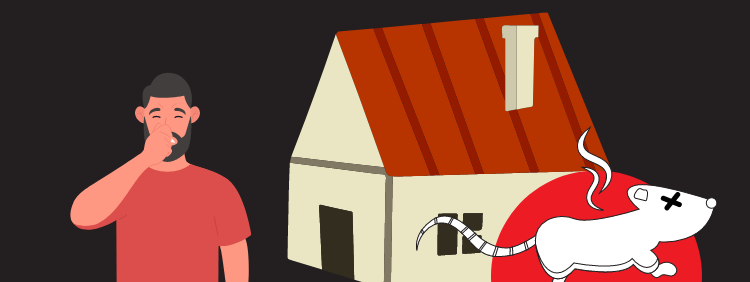How To Tell There Is A Dead Mouse in Your Richmond Hill Home

Mice in your home are annoying enough when they are alive, but if one dies in your home it can cause even more problems. Professional rodent removal by Truly Nolen resolves an infestation and includes cleanup. If a mouse has died in your home, here are some tips for coping with the situation.
How Do You Know if There Is a Dead Mouse in Your Home?
There are a couple of signs that you have a dead mouse in your home. The first sign you notice is often a pervasive smell. As the rodent’s flesh decays, it produces a number of noxious gases, including methane and sulphur dioxides that combine to produce a sort of sour, oppressive chemical odour that is difficult to describe but instantly recognizable. Once you smell it, you’ll never forget it and instantly be able to identify it in the future.
As a rodent carcass decays, it leaks fluid. A porous material, such as drywall, may absorb the fluid if the latter comes in contact with it. This can cause the material to become discoloured. The decaying process is over when the carcass is completely dried out, at which point the smell goes away as well. However, this can take weeks, and most homeowners do not want to live with the smell that long.
A decaying carcass also draws insects such as flies and beetles. They feed on the flesh and lay their eggs on it so the larvae have food when they hatch. If you notice more insects around your home than usual, it could be another sign of a dead rodent.
What Are the Dangers of a Dead Mouse in Your Home?
In addition to attracting other pests to your home, dead mice are dangerous because they can expose you to disease. While they are still alive, mice can carry and spread diseases through their urine and feces. These pathogens do not automatically go away just because the rodent has died. Additionally, the carcass is loaded with bacteria that are breaking down the tissues during the decaying process, and some of these may be harmful to humans as well.
How Do You Locate and Dispose of a Dead Mouse?
As prey animals, mice prefer hiding in small, dark places that provide protection from predators. Because of their size, they can hide in places that are inaccessible to humans, such as wall voids. Because the carcass may be hidden, you may have to rely on your sense of smell to find it. When you get closer to the source of the smell, it becomes stronger, so if you can pinpoint where the odour is most offensive, the carcass should be nearby. However, you may have to cut holes in the walls or the floor to find it.
Once you find the carcass, you should be careful when disposing of it to avoid pathogen exposure. Wear personal protective equipment such as gloves when handling a dead mouse. Rather than just tossing it in the trash, seal it in a plastic bag first. This helps protect against disease and also helps to make the smell a bit more bearable. Wash your hands after taking off the gloves and ventilate the affected area thoroughly.
What Can You Do To Prevent an Infestation?
If you can keep mice out of your home, you don’t have to worry about them dying there. You can prevent an infestation by sealing off potential entry points, such as holes in walls, cracks in the foundation, or gaps around windows or doors. Even if they get in, you can discourage them from staying by keeping your house clean and making food inaccessible by putting it away in glass, metal, or plastic containers.
Call Truly Nolen for Rodent Removal
Truly Nolen provides pest control in Richmond Hill. Our comprehensive process includes vector control to get rid of parasites and exclusion to keep them from coming back. Contact us for an inspection today.